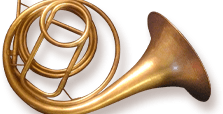March 7, 2024
House of Time
An interview between John Thiessen and Tatiana Daubek
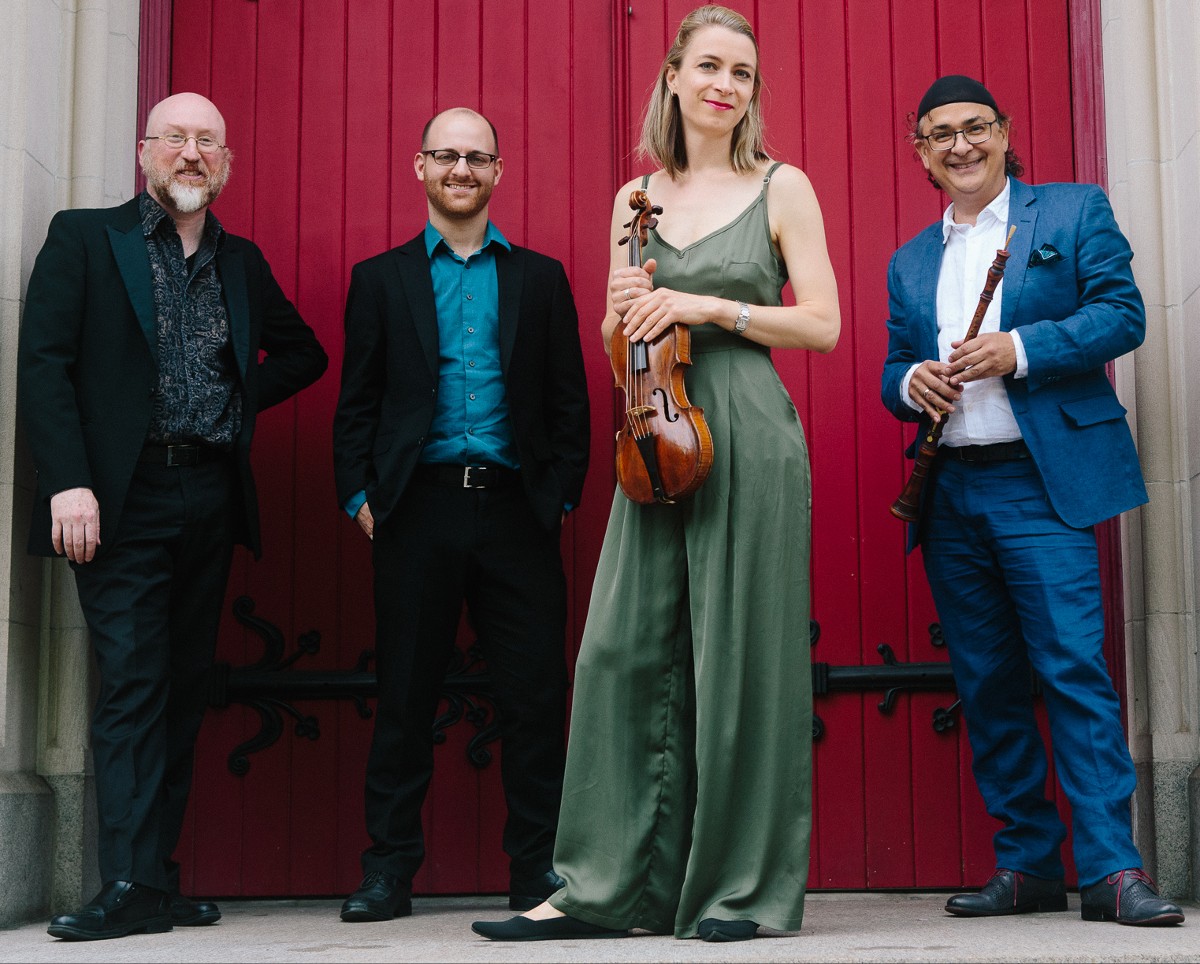 JOHN: We are joined by Tatiana Daubek, violinist and director of the early music ensemble House of Time. Welcome, Tatiana.
JOHN: We are joined by Tatiana Daubek, violinist and director of the early music ensemble House of Time. Welcome, Tatiana.
TATIANA: Thanks John! I’m grateful to be talking a little bit today about myself and House of Time, the ensemble I founded 10 years ago with Gonzalo X. Ruiz.
JOHN: When I first met you at the Boston Early Music Festival, you were studying at Boston University. Take us on the journey from then to now, especially the blossoming of your career in early music.
TATIANA: I have fond memories of my time in Boston, although it was a transitory time. I had embarked on a Master’s Degree in Violin Performance at Boston University with professor Dana Mazurkevich in 2006. She was lovely and allowed me to continue my Baroque violin studies (some teachers didn’t like that!) but I was on the search for learning more about period performance, especially Baroque violin. At the time, there were very few programs in the United States that offered degrees in Historical Performance unless one were to go to Europe. I took lessons here and there on the side with people including Elizabeth Blumenstock and Monica Huggett, who would subsequently lead the Juilliard program starting in 2009. BU was very supportive and allowed me to do my Master’s recital on both the modern violin and Baroque violin. So I played Ysaye and Piazzolla on my modern violin and a solo Bach Sonata on my Baroque violin. I was the first student who had ever done that — and I remember one of the violin professors saying after a jury to “allow” me to do such a thing, “Wow, Bach actually sounds good on the Baroque violin”. It was that moment when I had won the hearts of the old-school, very modern professors, and I think might have helped change some of the thinking in the string department. Anyway, fast forward to 2009, and my hopes and dreams were fulfilled after getting accepted into The Juilliard School’s Historical Performance department to study alongside a world–renowned faculty, and my true inspiration at the time — Monica Huggett. The two years at Juilliard were short but filled with wonderful memories, experiences, and exceptional colleagues. It was shortly after graduation from there that I knew I wanted to “do something” with my early music background, instead of waiting for the phone to ring for a job (which it did… but that’s another topic).
JOHN: I’m glad the BU violin professor noticed that Bach sounds good on the Baroque violin! How wonderful though that Dana Mazurkevich was so welcoming of your interest in the period violin and that you were able to continue your focus at Juilliard. Your ensemble House of Time emerged as a result of your studies at The Juilliard School and will celebrate its 10th year next season — a great accomplishment! House of Time is in residence at Manhattan’s Holy Trinity Lutheran Church and plays brilliant concerts throughout the United States annually. How did the group begin and what did you set out to do besides astonishing your audiences? Who are the members of the ensemble?
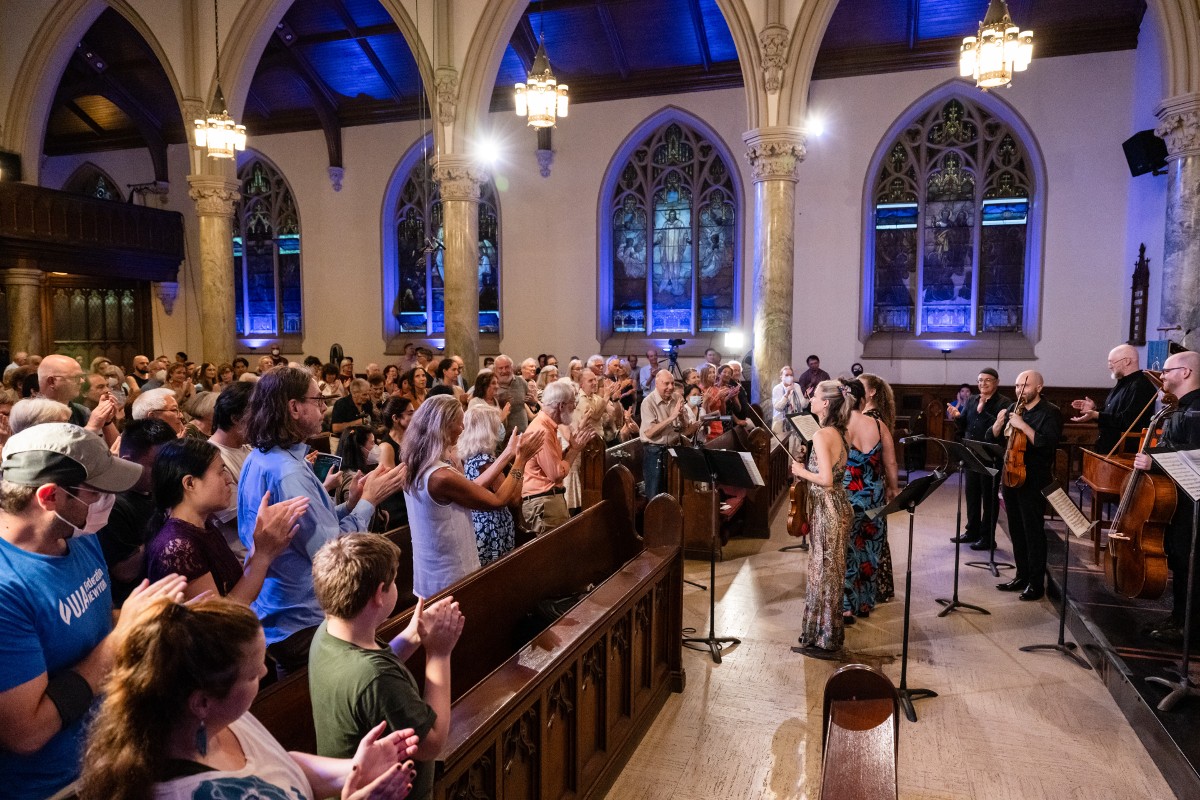 TATIANA: House of Time was formed in 2013, from Juilliard graduates and faculty. Our first performance, a house concert in Westchester County, was canceled due to lack of power from Hurricane Sandy! We re-scheduled, played the concert, and said that was fun… let’s do more! We then planned three concerts for the following season, including two at Holy Trinity and one at the Czech Center. Low and behold, that bit of steam propelled us forward. People liked us, audiences wanted more! In 2014, some colleagues of mine presented the New York Early Music Festival, with early music concerts all over New York City in different venues. I’d like to say this really increased our following and all of a sudden, we had a growing mailing list, and we were on a roll! Subsequently, we’d apply for grants from New York State and have received an annual NYSCA award for the past 8 years! Not only do we self-present concerts in New York, but we’ve played all over the country, from San Francisco and San Diego, to Las Vegas, New Haven, Michigan, and Milwaukee. Over the years, as a self-presenting ensemble, we are constantly tweaking the way we get people in the door. It’s definitely hard work! I can’t believe we’ve made it 10 years. One of our favorite annual programs to present is the Vivaldi Concerti Festival, where we invite outside guests to perform a concerto of their choice. This past year we chose to program Vivaldi’s Four Seasons. The program always includes a recent Juilliard graduate and notable guests including Krista Bennion Feeney, concertmaster of the Orchestra of St. Lukes, Elizabeth Blumenstock, former concertmaster of Philharmonia Baroque Orchestra, Aisslinn Nosky, concertmaster of the Handel and Haydn Society, and Cynthia Roberts, Professor of Violin at Juilliard’s Historical Performance Program. We are blessed with 4 core members — me on violin, Gonzalo X Ruiz on oboes, recorder and guitar, Elliot Figg on harpsichord, and Matt Zucker on violoncello and viola da gamba.
TATIANA: House of Time was formed in 2013, from Juilliard graduates and faculty. Our first performance, a house concert in Westchester County, was canceled due to lack of power from Hurricane Sandy! We re-scheduled, played the concert, and said that was fun… let’s do more! We then planned three concerts for the following season, including two at Holy Trinity and one at the Czech Center. Low and behold, that bit of steam propelled us forward. People liked us, audiences wanted more! In 2014, some colleagues of mine presented the New York Early Music Festival, with early music concerts all over New York City in different venues. I’d like to say this really increased our following and all of a sudden, we had a growing mailing list, and we were on a roll! Subsequently, we’d apply for grants from New York State and have received an annual NYSCA award for the past 8 years! Not only do we self-present concerts in New York, but we’ve played all over the country, from San Francisco and San Diego, to Las Vegas, New Haven, Michigan, and Milwaukee. Over the years, as a self-presenting ensemble, we are constantly tweaking the way we get people in the door. It’s definitely hard work! I can’t believe we’ve made it 10 years. One of our favorite annual programs to present is the Vivaldi Concerti Festival, where we invite outside guests to perform a concerto of their choice. This past year we chose to program Vivaldi’s Four Seasons. The program always includes a recent Juilliard graduate and notable guests including Krista Bennion Feeney, concertmaster of the Orchestra of St. Lukes, Elizabeth Blumenstock, former concertmaster of Philharmonia Baroque Orchestra, Aisslinn Nosky, concertmaster of the Handel and Haydn Society, and Cynthia Roberts, Professor of Violin at Juilliard’s Historical Performance Program. We are blessed with 4 core members — me on violin, Gonzalo X Ruiz on oboes, recorder and guitar, Elliot Figg on harpsichord, and Matt Zucker on violoncello and viola da gamba.
JOHN: You have done all the rights things for House of Time, including self-presenting — a daunting challenge — but one which provides true artistic freedom. You have built an extensive Rolodex and you know your patrons personally. NYSCA support, in addition to that from your avid followers, allows you to present fabulous projects. Now, Tatiana, not only are you a virtuoso violinist, but you are also an accomplished photographer and videographer. How do these two fields complement each other both artistically and for House of Time?
TATIANA: Thanks for asking this question, John! A lot of people ask me how I “do it all!” I think that as a musician, I have a keen sense of intuition for capturing people’s real essence on camera. I’ve been told that I make my subjects feel at ease, especially when they come in completely mortified of having to pose in front of a camera. My photography career started when I was living in Boston almost 20 years ago. I had made a few friends who were getting real certificates in photography, and I owe it to them for all I learned. Of course, there’s always trial and error but it’s important to ask questions, get feedback, and take a lot of pictures! One day, a colleague of mine asked me to take his photo… that blossomed into a career of musician portraits, and to this day, I am splitting my time between performing and capturing people on camera. During the pandemic, we were shut up in our homes, but House of Time still wanted to play music and present it to our fans. We invested a bit of time and money into a home recording studio, and with Gonzalo’s audio engineering background, coupled with mine in photography, we made the plunge to purchase some video cameras. Still learning along the way, it’s also blossomed into a third videography career. The need for high-end recordings is at an all-time high, and we’ve been very busy.
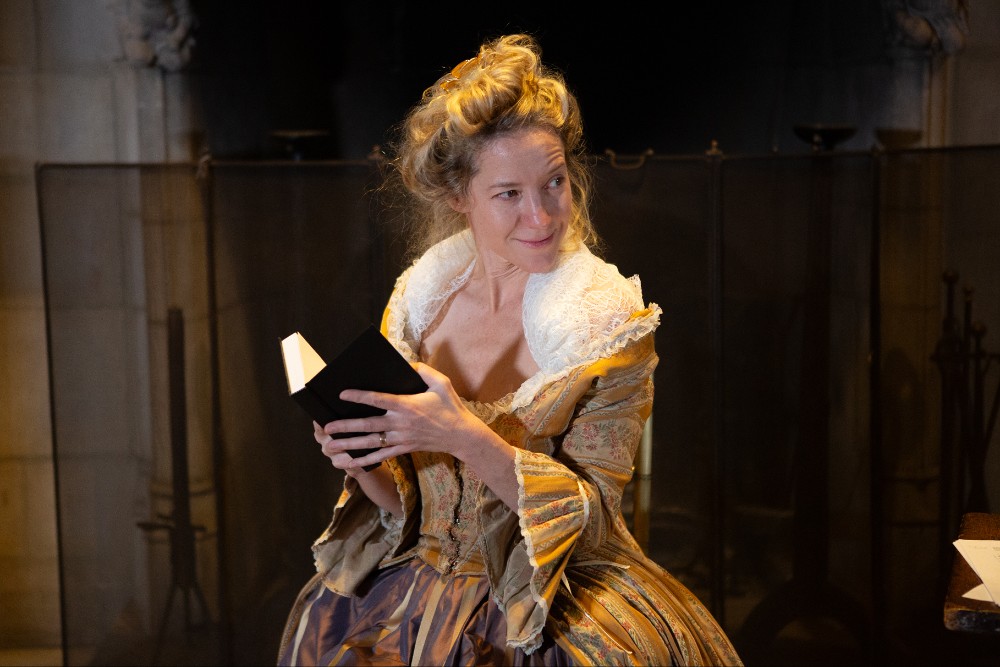 JOHN: How interesting! As a result of the pandemic, GEMS quickly pivoted to livestreaming our Midtown Concerts series on which House of Time has appeared frequently. Your group has a fascinating performance coming up Saturday, March 23 at Riverside Church entitled A Poisonous Affair, a play written by your husband and early music phenom Gonzalo X. Ruiz, and starring acclaimed actor Brooke Bloom, in a portrayal of Louis XIV’s favorite mistress Madame de Montespan. The reign of Louis XIV from 1643 until 1715 represented a time of significant importance for French music. Will repertoire from around the time of the scandal known as the Affaire des Poisons (1677) feature prominently in your production?
JOHN: How interesting! As a result of the pandemic, GEMS quickly pivoted to livestreaming our Midtown Concerts series on which House of Time has appeared frequently. Your group has a fascinating performance coming up Saturday, March 23 at Riverside Church entitled A Poisonous Affair, a play written by your husband and early music phenom Gonzalo X. Ruiz, and starring acclaimed actor Brooke Bloom, in a portrayal of Louis XIV’s favorite mistress Madame de Montespan. The reign of Louis XIV from 1643 until 1715 represented a time of significant importance for French music. Will repertoire from around the time of the scandal known as the Affaire des Poisons (1677) feature prominently in your production?
TATIANA: You are right, this performance is fascinating! Not only does my oboe extraordinaire husband perform as the oboist but he actually wrote the play (wait, he writes plays now too?) I am super impressed. Initially, it was my idea… I knew I wanted to work with my good friend Brooke, who’s an accomplished actress and knowing that she enjoys period roles, I thought we could maybe do something involving Louis the XIV’s favorite mistress, Madame de Montespan, who left us a thick book of her memoirs. I said to Gonzalo, “Any chance you can come up with something interesting that involves these memoirs and includes Brooke?” John, you ask if we’ll be playing music from the period and the answer is YES! We’ll perform almost all the music Montespan would have likely heard at court: Marais’ Trios and unmeasured preludes of Louis Couperin. Marais’ famous Sonnerie de Sainte-Geneviève du Mont de Paris, "The Bells of St. Genevieve”, features prominently during the Affair of the Poisons scene. It’s hard to leave out such a scandalous time at court, where everyone was accused of poisoning one another. One of my favorite lines that Gonzalo wrote in the Poisons scene is, “Cooks and servants were arrested, but mon Dieu, if one were to seize all the bad cooks in Paris, the jails would have no room for murderers and thieves”. The big question that Gonzalo’s play explores is if indeed Mme de Montespan is guilty or innocent of the accusations against her. You’ll have to come and decide for yourself!
JOHN: What a wonderful cliffhanger! How did you come to choose Brooke Bloom to play Madame de Montespan? And how did you choose the venue?
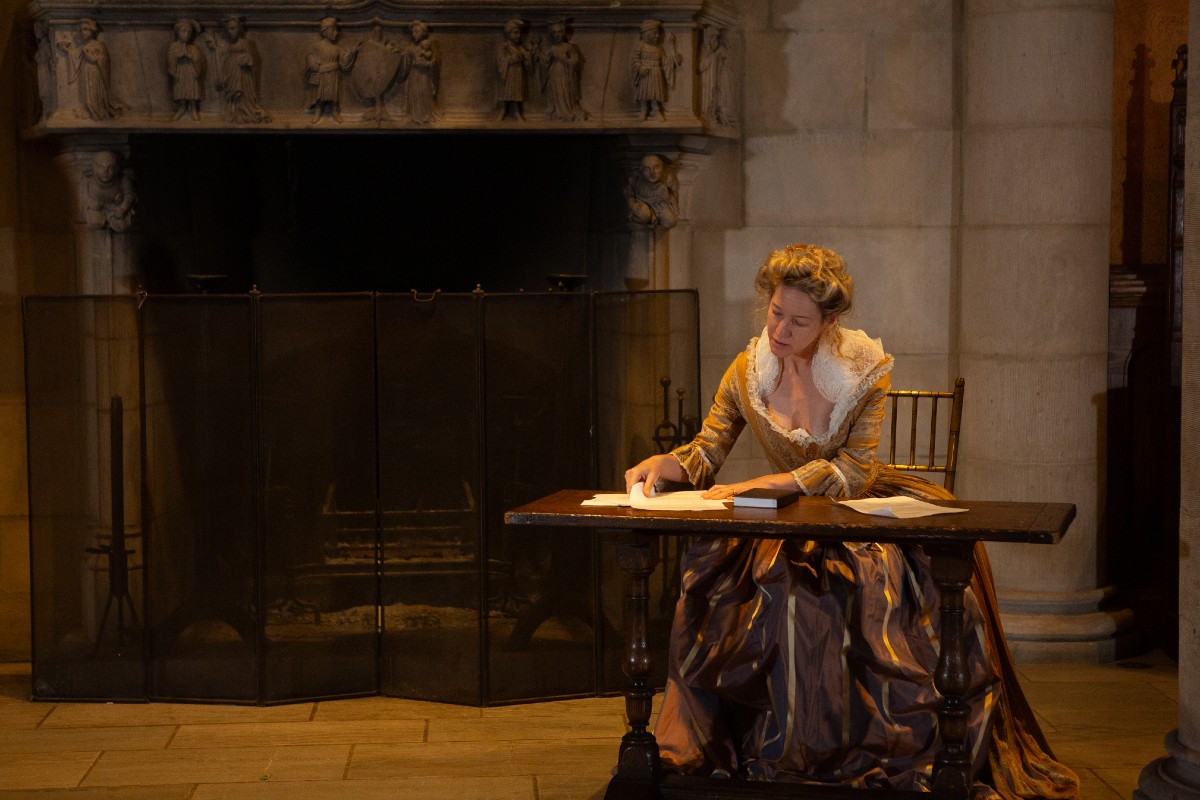 TATIANA: Brooke and I met in 2019 when she moved into my complex at Hudson View Gardens and she also had a young child the same age as mine. Our children became instant best friends at the tender ages of one and two, and we’ve become good friends as well. We see each other almost every day in some capacity or another. Brooke has an accomplished career in film, television, and theatre and we frequently talk about similar aspects of the creative process. A veteran of the New York stage, Brooke won an Obie Award for Best Actress, and garnered a Best Actress Drama Desk nomination for her work in Clare Barron's Off-Broadway play You Got Older. You can read more about her here. I certainly haven’t seen all the things she’s done, but when I watched a couple of episodes of her in the TV show The Gilded Age and then I finally saw her perform live on stage a year ago in Lucy, a play about motherhood, nannies, and whom we invite into our homes at Audible's Minetta Lane Theatre, I knew she’d be a great fit to do something with House of Time. The venue, the Rockefeller Lounge on the 9th Floor of Riverside Church, is incredible. It was decided late in the game but when we saw it, we said “This is perfect!” It has the feel of old Europe — a bit like Versailles, with its large columns, vaulted ceilings, and gorgeous inviting orange tones.
TATIANA: Brooke and I met in 2019 when she moved into my complex at Hudson View Gardens and she also had a young child the same age as mine. Our children became instant best friends at the tender ages of one and two, and we’ve become good friends as well. We see each other almost every day in some capacity or another. Brooke has an accomplished career in film, television, and theatre and we frequently talk about similar aspects of the creative process. A veteran of the New York stage, Brooke won an Obie Award for Best Actress, and garnered a Best Actress Drama Desk nomination for her work in Clare Barron's Off-Broadway play You Got Older. You can read more about her here. I certainly haven’t seen all the things she’s done, but when I watched a couple of episodes of her in the TV show The Gilded Age and then I finally saw her perform live on stage a year ago in Lucy, a play about motherhood, nannies, and whom we invite into our homes at Audible's Minetta Lane Theatre, I knew she’d be a great fit to do something with House of Time. The venue, the Rockefeller Lounge on the 9th Floor of Riverside Church, is incredible. It was decided late in the game but when we saw it, we said “This is perfect!” It has the feel of old Europe — a bit like Versailles, with its large columns, vaulted ceilings, and gorgeous inviting orange tones.
JOHN: I understand that following this special performance on March 23, there will be a reception.
TATIANA: We hope everyone will want to attend, so they can meet us afterwards with a glass of wine, and most importantly, chat with the writer, Gonzalo X. Ruiz and the actress Brooke Bloom. This reception is a little different from usual; one will need to purchase a premium ticket that includes the reception. We love connecting with our audience after all our shows.
JOHN: GEMS is happy to help behind the scenes as your fiscal sponsor and we wish you, Gonzalo, Brooke, and the rest of the cast the best of success. We look forward to the film version of A Poisonous Affair (hint hint) sometime soon! How can GEMS’ early music community support House of Time for this and your other fabulous projects?
TATIANA: We’ve been thrilled that GEMS is so supportive for early music in New York and to be fiscally sponsored by your organization. Anyone interested in supporting us can donate here. We hope this project opens up some new audiences for us — especially those who might like opera, staged productions, or something with a story.
JOHN: I’m sure A Poisonous Affair will further increase House of Time’s audience. Good luck with the production!
View House of Time in action:
